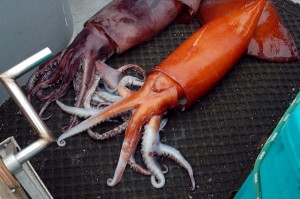
Scientists are asking themselves that question after hundreds of deep water Humboldt squid stranded themselves over the weekend. Hannah Rosen of Stanford’s Gilly Lab at the Hopkins Marine Station in Monterey told KQED's Peter Jon Shuler the squid might be disoriented.
Rosen says large stranding events appear to occur when the squid are invading a new area, and one theory is that the squid might become disoriented in the new surroundings. She says the strandings stop if the squid successfully colonize an area or leave.
Both Hopkins University researcher William Gilly and John Field, a Santa Cruz research biologist with the National Marine Fisheries Service, also have suggested that the squid might be disoriented. From the Santa Cruz Sentinel:
"My theory is that when the squid invade a new area -- they are returning to Monterey Bay for the first time in nearly three years, and the squid are only 8 or 9 months old -- they follow an algorithm (which is to) swim and find productive areas, especially by investigating anomalies, until you run into trouble," (Gilly) said. "That mission takes some of them onto the beach. The question I can't answer is why they stop doing this after they successfully colonize an area. Perhaps the real pioneers are selected out, or maybe the survivors of a stranding go back to sea and warn the others...."
"I think a lot of stranding is just losing track where they are in surface waters," Field said. "They are in deep water, 200 to 400 meters, during the day and come up to feed at night. And there is a strong onshore transport of oceanic water this type of year and they might get trapped over the shelf and not know where to go, so they just keep feeding and foraging and wash up."
The San Francisco Chronicle noted that it's not the first time dead squid have been reported in large numbers on Bay Area beaches.
The creatures, which can reach almost 5 feet in length and will eat almost anything smaller than they are, including their own species, have been lurking in Monterey Bay since summer. Dead squid were first reported in October, when about 100 washed up in Pacific Grove.
The Bay Area has witnessed other mass animal die-offs in the past, as well as reports of large numbers of animals struggling to survive. Researchers theorize that these occur for a variety of reasons.
- About 200 dead carp recently washed up on shore at Pinto Lake in Watsonville. Researchers say they may have been victims of toxic algae.
- In July, large numbers of starving young pelicans were spotted on Bay Area beaches in what was thought to be part of a natural die-off.
- Investigators think a truck killed about 100 birds in Sonoma County in 2011.
- As many as 50 leopard sharks washed up on shore near Redwood City over two weeks in 2011. A researcher theorized that the sharks' oxygen supply was depleted by a system of lagoons and canals.
- In 2005, thousands of squid beached themselves on California shores. Gilly told National Geographic that the squid may have spent too much time in warm water and eaten something toxic.
In addition to perplexing researchers, mass animal deaths also can be a gruesome sight for witnesses.The Santa Cruz Sentinel shot this video of dead squid on the beach in Aptos over the weekend.